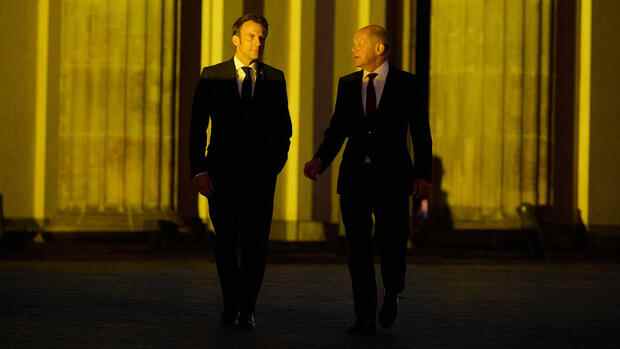The federal government also referred to “simple logistical difficulties”, for example cabinet members were prevented from attending school holidays in Berlin at the same time. However, government spokesman Steffen Hebestreit conceded that there was still a need for clarification on some bilateral issues: “These agreements will take some time.”
The sudden cancellation of the meeting in Fontainebleau shows how bad Franco-German relations are at the moment. For weeks, there has been growing dissatisfaction with German politics in the French government. The dissatisfaction also applies to Chancellor Olaf Scholz (SPD), who is accused of national egoism in the energy crisis in Paris.
Scholz and French President Emmanuel Macron met on the sidelines of the EU summit in Brussels on Thursday. The Élysée Palace then released a sober-sounding statement.
Top jobs of the day
Find the best jobs now and
be notified by email.
Scholz and Macron had agreed to “encourage discussions between French and German ministers to continue so that the next Franco-German Council of Ministers can be as substantial and ambitious as possible”. We would like to agree on a new date soon.
First difficulties: finding a date
The cabinet members from Germany and France actually meet once a year. The consultations last took place in May 2021 and at that time only as a video conference due to the pandemic. For the first Council of Ministers with Chancellor Scholz, a date at the end of June was initially planned, and then it should finally take place on October 26th.
The relationship between Olaf Scholz and his French counterpart has cooled
(Photo: Getty Images)
Instead of adopting a final declaration without concrete results or even risking Franco-German discord on the open stage, Paris and Berlin preferred to cancel the event. According to reports, January is being considered for a new date – then Germany and France also want to celebrate the 60th anniversary of the Élysée Treaty between the two countries.
The question is whether the celebratory mood will have returned by January. “The postponement is a bad sign,” said Éric-André Martin of the Paris think tank Institut français des relations Internationales. “When scheduling problems are cited, it is an indication that there are serious difficulties.”
The differences are also a risk for cooperation in the European Union, Martin said. Ironically, during the energy crisis and during the Russian war against Ukraine, the Franco-German engine in Europe failed.
“Solidarity” in the energy crisis
The rift primarily concerns energy policy. For a long time, the criticism in Paris was only voiced behind closed doors: Germany is opposed to the joint initiatives at the European level.
>> Read also: The big barter – How Germany and France want to master the energy crisis together
Instead, there was a lot of talk in public statements about “solidarity” in the energy crisis: France supplies gas to Germany, which in turn wants to help out its neighbors with electricity in winter.
On the Day of German Unity, Scholz received the French President for dinner at the Chancellery. Macron tweeted: “Tonight in Berlin to further strengthen the friendship between our countries and to prepare the next meetings of our European Union.”
No more of that kind of niceties. At the EU summit, Macron criticized the German course in the energy crisis with unusually sharp words: “I think it’s not good, neither for Germany nor for Europe, that they isolate themselves,” said the President.
The two countries also disagree on armaments policy.
(Photo: dpa)
The French are also upset about the federal government’s €200 billion relief package in the energy crisis. Germany has not agreed on the plans in the EU and could distort the European internal market with the huge sum, so the accusation. However, the critics overlook the fact that the French government is also spending a high double-digit billion amount to cushion the high gas and electricity prices without European agreements.
The accusation of selfishness has meanwhile also been raised against France in the federal government. The main concern is the construction of a pipeline through the Pyrenees, through which gas and later green hydrogen should flow from Spain to the north. Scholz promoted the project, Macron opposed it.
France and Germany argue about armaments
Another point of conflict is the armaments policy. France reacted with satisfaction when Scholz announced a special fund of 100 billion euros for the Bundeswehr.
But the joy evaporated when it became clear that the money would be used to purchase armaments from the USA. In contrast, the joint armaments projects that Berlin and Paris have agreed on are hardly making any headway.
>> Read also: Germany is threatened with defeat at the EU summit – because the chancellor is said to have neglected something
With regard to German procurement, Macron warned a few months ago: A European defense community based on armaments imports “makes no sense”. Government circles in Berlin, on the other hand, are criticizing that Paris is protecting the French aircraft manufacturer Dassault, which is responsible for the project together with the armaments arm of the European Airbus group, for the planned FCAS combat flight system.
At the end of September, Federal Defense Minister Christine Lambrecht and her colleague Sébastien Lecornu jointly emphasized their support for the Franco-German armament projects. The hope was actually that progress on the FCAS could finally be presented at the Council of Ministers – that is now cancelled.
More: Franco-German government talks postponed to January
